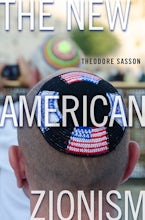The New American Zionism
In The New American Zionism, Theodore Sasson challenges the conventional view of waning American Jewish support for Israel. Instead, he shows that we are in the midst of a shift from a "mobilization" approach, which first emerged with the new state and focused on supporting Israel through big, centralized organizations, to an "engagement" approach marked by direct and personal relations with the Jewish state.
Today, growing numbers of American Jews travel to Israel, consume Israeli news and culture, and focus their philanthropy and lobbying in line with their personal political viewpoints. As a result, American Jews find Israel more personally meaningful than ever before. Yet, at the same time, their ability to impact policy has diminished as they no longer speak with a unified voice.
Contributor Bios
Reviews
"The New American Zionism offers an important challenge to the widely accepted belief that the relationship between American Jews and Israel has entered a time of crisis . . . . Sasson's corrective to recent scholarship on distancing from Israel helps to explain the enduring centrality that Israel holds in American Jewish life across generational cohorts . . . . Thanks to this study, the distancing hypothesis now has an alternate interpretation of American Jewish attitudes toward Israel." ~ Noam Pianko, H-Net
"Theodore Sasson's new book - The New American Zionism - is a serious book. That is to say that in a field filled with the ignorant, the manipulative, and the charlatanic, Sasson offers a fact-based and measured analysis of the uneasy relationship between American Jews and Israel. That the release of this book did not make huge waves in the world of punditry is therefore just as unsurprising as it is unfortunate: Sasson doesn't hyperventilate a catchy theory of doom, and doesn't project a new era of flourishing relations. He paints an accurate, if complicated, picture of a changing relationship - changing for good and for bad and, at times, in ways yet to be decided." ~ Shmuel Rosner, Jewish Journal
"Offers bad news for Israel's critics by providing good news about American Jews' relationship with Israel. Sasson's thoughtful, subtle, compelling analysis of American Jewish public opinions provides a rich and readable look at the multidimensional and ever-evolving ties Jews have with the Jewish State." ~ Gil Troy,author of Why I am A Zionist: Israel, Jewish Identity and the Challenges of Today
"Theodore Sasson challenges the often facile and sensational claims of the 'distancing' of American Jews from Israel in this well written, deeply researched and original book. He persuasively argues that a new and vital pluralism distinguishes the current relationship between American Jewry and the Jewish state, contesting the fashionable prophets of despair with a view of how passionately and directly American Jews actually engage with Israel . . . . An essential study of a highly contested and emotional issue and an important contribution to the field of Diaspora-homeland studies." ~ Ilan Troen,Director, Schusterman Center for Israel Studies, Brandeis University
"The New American Zionism emerges out of a decade-long debate among observers of American Jews, about whether Jewish attachments to Israel are waning. Sasson has quickly established himself as a skeptic of claims of distancing, and here he makes his strongest case yet, mounting an array of evidence that triangulates multiple methods and multiple data sources. Importantly, he treats thequestion of American Jewish engagement with Israel not simply as a matter of personal identities and feelings of attachment but of institutionalized collective behavior, shifting the terrain of the debate from social psychology to sociology." ~ Social Forces
"The New American Zionismis neither defense, nor lament, nor celebration, nor critique Readers can decide their own politics for themselves. This, along with the crisp prose, good opening primer on the history of the relationship, and rich focus-group data that bring in real peoples voices, make the book especially accessible to newcomers to the topic and well suited for undergraduate classes" ~ Social Forces
"How disconnected are American Jews from the State of Israel? Many have engaged with alarm the claims by commentators like Peter Beinart, who point to a waning enthusiasm young American Jews feel toward Israel. But is this an accurate picture? In his groundbreaking studyThe New American Zionism, Theodore Sasson analyzes several key but neglected indicators of American Jewish attitudes to add greater nuance to this question. Not only does he examine the fundamental problem raised by Beinart and others, he challenges the framework by which much scholarship has engaged with this loaded topic." ~ American Jewish History
"Sassons well-documented report may be a partial antidote to the recent Pew Report showing decreased religious affiliation among Jews. Despite the drop in centralized funding, overall giving to Israel has increased, and engagement by Americans with Israel is alive and well." ~ Publishers Weekly
"[] Theodore Sassons historical narrative,The New American Zionsimoffers a provocative multivocal rendition of the current discussions of the future of Israels longstanding, if sometimes vexed, relationship with United States Jewry" ~ Cultural Critique
 This work is licensed under a
Creative Commons Attribution-NonCommercial-ShareAlike 4.0 International License
(CC BY-NC-SA).
This work is licensed under a
Creative Commons Attribution-NonCommercial-ShareAlike 4.0 International License
(CC BY-NC-SA).


